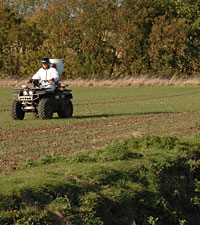Pest control survey identifies need for more training

Most countryside users of rat baits and slug pellets do so safely and responsibly, according to a survey for the Campaign Against Illegal Poisoning.
But phone interviews with over 100 farmers, gamekeepers and pest control officers last summer, before the launch of the Get Pelletwise campaign, suggested there was scope for more training in their application and more clearly defined codes of practice.
Concerns for pets, children, wildlife and the environment, compliance with farm assurance and accreditation schemes, as well as cost savings were the main factors influencing users’ behaviour, the survey by market research company dmrkynetec found.
All respondents believed they were taking the necessary actions to minimise risk. But 88% of rodenticide users had not heard of the Campaign for Responsible Rodenticide Use code “Think Wildlife”.
“The main barrier to safe use in practice is limited knowledge,” concluded the firm’s Carol Willey. “However, most users of rodenticides and slug pellets do not recognise the need for additional advice and training. When they participate in training activities many are surprised by the benefits gained.”
Although slug pellet users took regular advice from agronomists, the survey identified a strong need to improve the quality of rodenticide advice for farmers and gamekeepers, who relied mainly on their experience.
Just over half the slug pellet users had attended in training courses and seminars; for example, NRoSO’s “Slugs, Solids & Safety'”during the previous six years. But less than a third of rat bait users had taken part in any training, and those that had had done so mostly more than three years earlier.
Quoting one gamekeeper: “Refreshers don’t hurt. A half-day course every five years to get people up to speed and update their methods is helpful to ensure approaches we use are efficient and understand changes in legality” Mrs Willey said those who participated found the training very useful.
Although gamekeepers were reasonably well aware of the various guidelines and codes of practice for controlling foxes, crows and magpies, farmers were not, the survey discovered.
“Most farmers are confused regarding legal control practices for the management of crows and magpies,” she said.

